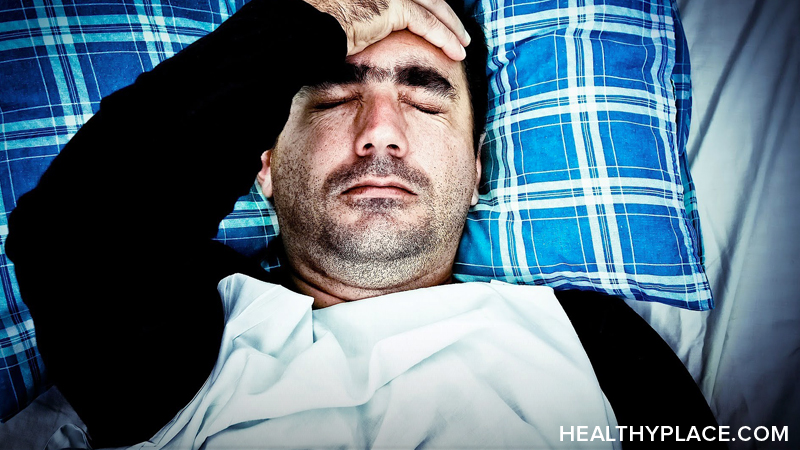
The effects of a person's bipolar illness on the family may vary from mild to devastating. As a family member, here's what you need to know.
Effect of Bipolar Disorder on Family is Far Reaching
Depending on the nature of an individual's manic-depressive illness (aka bipolar disorder), the family will be affected in many ways. Where mood swings are mild, the family will experience many forms of distress but, over time, may adapt well enough to the demands of the illness. If episodes are more severe, the family may need to work through extreme difficulties in several ways:
- emotional effects of the illness
- social effects
- changes within family members
- changes within family structure
- expectations
- ways of reducing stress
- coping with the threat of suicide
- ways of establishing good communication lines with family members and with outside resources
The Emotional Effects of Bipolar Disorder
If symptoms are related to an individual's aggression or inability to fulfill responsibilities, family members may well become angry with the individual. They may experience anger if they see the individual as malingering or manipulative. Anger can also be directed at the "helping" professionals who are unsuccessful in curing the illness "once and for all". Anger may be directed at other family members, friends or God.
Typically, these same family members experience feelings of extreme guilt (read Bipolar Guilt) after the individual has been diagnosed. They are concerned about having had angry or hateful thoughts and may wonder whether they somehow caused the illness by being unsupportive or short-tempered (read about causes of bipolar disorder). Moreover, much literature and other media of the past few decades have largely supported (erroneously) a common notion that parents are somehow always responsible for producing mental illness in children. And so, parents and to a lesser degree, other family members may find that feelings of guilt and the wish to compensate for any wrongdoings prevent them from effectively setting limits and developing realistic expectations.
If the individual's illness creates an ongoing burden for the family because of such things as decreased income or continual disruptions in family routines, it is not uncommon for family members to find themselves in a cyclic pattern of alternating feelings of anger and guilt.
Equally painful is the sense of loss that is associated with the growing awareness that, in severe cases of recurrent manic-depressive illness, an individual may never be quite the same person the family knew before the illness. There is grieving over lost hopes and dreams. The mourning process is usually marked with periods of resignation and acceptance and intermittent periods of renewed grief stimulated perhaps, by the accomplishment of a peer, a family celebration or some other seemingly minor event. Eventually, as with any other loss, whether the end of a marriage, the death of a loved one, or the loss of ability through illness or accident, what is needed is a careful re-evaluation of goals and an adjustment of expectations.
Related here, may be some feelings of shame associated with unfulfilled expectations and with the stigma of mental illness. It may be interesting for family members to realize that one of the reasons that mental illness carries with it such a stigma is that mental illness is often associated with decreased productivity. The value of productivity and the notion of "the bigger the better," have long formed a mainstay of North American culture. The family may have to grapple with whether they want to place such emphasis on these values. Shifting emphasis on to values related to family, spirituality or other focus may help to diminish any unnecessary suffering due to feelings of shame.
Finally, anxiety may be ever present as family members grow to continually anticipate a change of mood, a return of bipolar symptoms. Families may find planning events fraught with worries of whether the ill relative will present any problems at the event. There may be fear that unprovoked conflicts will arise at any time, that other family members may suffer. Children may fear that they will inherit the illness, they fear that they may have to manage the care of their ill relative as well as manage their own lives when the primary caretakers can no longer do the job. To cope with such consuming anxiety, some family members learn to distance themselves (both physically and emotionally) from the family, while others may put their personal goals on hold in anticipation of the next crisis. In any event, families need support to learn to manage anxiety and to lead as fulfilling lives as possible. Attending bipolar family support groups can help to relieve the pressure experienced by families caught in their stressful situations.
Social Effects Caused By Bipolar Disorder
In severe cases of manic-depressive illness, families typically find that their social network starts shrinking in size for several reasons. The family is often embarrassed by the varied symptoms of an ill relative whether these symptoms have to do with poor self-care skills or belligerent behavior. Visitors may feel awkward about what to say or how to help the family. Usually, they say nothing at all and soon both family and friends find themselves participating in a conspiracy of silence. Eventually, it becomes easier to avoid each other.
Going to a bipolar disorder support group is one way to help reduce the sense of isolation a family often faces. Through the practice of self-disclosure and the development of a vocabulary to use and the self-confidence to use it, a family can gradually learn how to communicate with extended family members and friends.
Changes Within Family Members
Family members often feel exhausted because of the time and energy spent on issues related to the illness. There is little energy left to invest in other potentially satisfying relationships or rewarding activities. Increased tension leads to the risk of marital dissolution and stress-related physical symptoms. It is not uncommon to hear worn-out spouses desperately stating, half-jokingly, half-seriously, "I'm the one who will be in the hospital next."
Siblings may experience jealousy if too much attention is devoted to the ill member and not enough to themselves. To deal with feelings of resentment and guilt, siblings spend more time away from the family. When the ill member is a parent who cannot meet the emotional needs of his or her spouse, a child may assume the role of confidante with the well parent and may sacrifice some of his or her own personal development as an independent individual.
In general, the emotional welfare of all family members is at risk because of the ongoing stress. It is important for the family to be aware of these risks and to take appropriate measures (for instance, getting support from outside sources) in order to minimize the risks.
Changes Within Family Structure
Regardless of which family member is ill, role relationships often shift in response to the illness. If, for instance, a father is unable to provide financial and emotional support, the mother may have to take on additional responsibilities in both spheres in order to compensate. She may find herself in the position of a single parent but without the freedom of decision-making afforded by single parenting. Added to this, the wife may find herself parenting her ill husband as she monitors his symptoms, his medications, and deals with his hospitalizations. As the husband's capacity for work and family participation fluctuates, the wife is at risk for ongoing confusion and resentment. Children may take on caretaking responsibilities when the mother is absent and as mentioned previously, may even become the sole source of emotional support for the mother when she is present. If a sibling is ill, other siblings may have to take on the role of caretaker when parents are away. All members are subjected to demands far greater than would be normally expected.
Bipolar Disorder and Changing Expectations
A major challenge facing families of manic-depressive patients is the formation of realistic expectations both of the mental health system and of the family member with bipolar.
a) Mental Health System
When families bring their ill member for medical help, they often expect a firm diagnosis and a clear cut bipolar treatment regimen, which will quickly and permanently cure the illness. They then expect the relative to resume normal life immediately following treatment.
It is usually only after several experiences of trial medications, many disappointments at the hospital and at home over unfulfilled expectations that the family starts to appreciate the somewhat nebulous nature of the manic-depressive illness. The illness has no clear cut beginning or end. There are often residual impairments and ongoing vulnerabilities (weaknesses) after acute treatment. The family must start taking into account the limitations of the mental health system both in terms of knowledge base and resources.
b) The Ill Individual
Some of the residual symptoms an ill relative can experience after acute treatment include social withdrawal, poor grooming, aggression and lack of motivation. A family must try to sort out what a relative is and is not capable of doing. Unrealistically high expectations may lead to frustration and tension and finally, relapse while too low expectations may lead to prolonged symptoms and increased depression in the relative and a sense of helplessness in the family. It may be necessary to give a helping hand or at times, to completely take over the regular duties of an ill member. As he or she recovers, the responsibilities should be returned at a comfortable pace.
Ways of Reducing Stress
Since the amount of stress in a person's life plays an important role in determining how seriously or how often a person may fall ill, it naturally follows that finding ways of reducing stress becomes a priority in a family dealing with manic-depressive illness.
Establishing clear expectations and structure within the family does much to reduce stress. For instance, a family may find itself adjusting to the irregular routines of an ill member who may be going to sleep late, waking up late, eating at odd times. Altering family schedules to accommodate his or her daily living patterns will inevitably lead to resentment and stress. It becomes necessary to make clear expectations.
a) Certain families may need to set up a regular daily schedule stating clearly when the recovering person is expected to wake up, eat meals, complete small grooming or household chores. Besides being an aid to reorganizing the ill person's thoughts, such a statement also serves as a message that the family wants the person included in their regular routine.
b) Including a recovering person in the planning for any vacation, outing, visit and other activities helps to relieve the anxiety related to unexpected events. Plans might include how the person would like to deal with the situation. Would he/she prefer to join the activity or to have quiet, private time?
c) Also, the family needs to have made specific plans regarding any problem behaviors so as to reduce the stress related to power struggles. Problem-solving, reaching an agreement, writing a contract as to what exactly is expected, when, how often, and what consequences will occur when the behavior takes place and when it does not, is often a useful purpose.
d) Finally, each family member may want to take stock of their own lifestyle patterns. Special emphasis is on assuring time to pursue one's own interests.
Coping with Bipolar Family Member's Threat of Suicide
Particularly stressful is the threat of suicide. When a family member is overtly suicidal, most families realize the importance of immediate professional help. However, suicidal intentions are also expressed in more subtle ways. As suicide is often an impulsive act, quite unexpected by family, it is important to be aware of some of the common warning signs:
- feelings of worthlessness, hopelessness
- feelings of anguish or desperation
- preoccupation with death or other morbid topics
- social withdrawal
- increased risk-taking, (speeding while driving, handling weapons, drinking heavily)
- sudden burst of energy, or brightened mood after being seriously depressed
- putting affairs in order (writing a will, giving possessions away)
- having an actual plan by which to commit suicide
- hearing voices that command self-mutilation or suicide
- having a family history of suicidal behavior
Immediate responses include:
- removal of all weapons, even cars or other potentially dangerous vehicles
- search for a stash of drugs to guard against an overdose. Ensure patient is taking medication
- calm communication with person to assess situation without condemnation. The person may feel less cut off and both may judge more easily whether protective hospitalization is in order
- communication with helping professionals
- decision whether constant supervision would be useful
Ways of Establishing Good Communication with Family Members
Conflicts are a natural part of family life. When bipolar disorder enters the picture, the issues that lead to conflict and anger often seem highlighted. Effective communication can serve to reduce the volatility of such issues to more manageable proportions.
Basic guidelines include:
a) Be clear and specific about expectations, feelings, dissatisfactions, hopes, limits and plans. "Please stop playing the piano so late at night. The rest of the family needs their sleep. If you can't stop playing after 10:30 p.m., we will put the piano into storage," in contrast to, "Stop being so inconsiderate. Don't you know...."
b) Be calm. Raising one's voice and becoming openly hostile only serves to escalate the conflict.
c) Give acknowledgement. Too often people try to immediately reassure people in distress, which turns out to be far from reassuring. A person in distress is more likely to feel calmer when his or her experience has first been validated by another person. "I can see why you'd be so upset if you think Billy is going to criticize you again. Let's see if there's some creative, assertive way you can deal with Billy if he does that again," rather than, "Don't be so silly, he didn't mean anything by it, just learn to stand up to him."
d) Be brief. Moralizing or going into great detail often leads to the message getting lost.
e) Be positive. Avoid unnecessary nagging and criticisms. Make an effort to recognize and acknowledge positive attributes, actions of the person.
f) Share information. Children find it particularly difficult to live at home with a parent suffering from a manic-depressive illness. They feel confused, afraid, hurt, ashamed as well as unknowledgeable about how to respond to a parent during the illness phase as well as after recovery. An open discussion about the illness can help to give the child some sense of control in an otherwise overwhelming situation. This sense of control helps, in turn, to preserve a sense of inner security.









